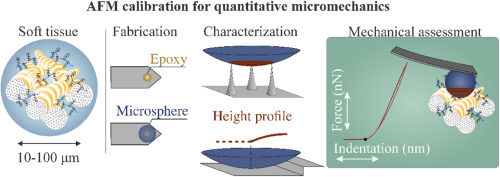Journal of the Mechanical Behavior of Biomedical Materials ( IF 3.3 ) Pub Date : 2018-05-17 , DOI: 10.1016/j.jmbbm.2018.05.026 Lukas Kain , Orestis G. Andriotis , Peter Gruber , Martin Frank , Marica Markovic , David Grech , Vedran Nedelkovski , Martin Stolz , Aleksandr Ovsianikov , Philipp J. Thurner

|
Mechanical assessment of biological materials and tissue-engineered scaffolds is increasingly focusing at lower length scale levels. Amongst other techniques, atomic force microscopy (AFM) has gained popularity as an instrument to interrogate material properties, such as the indentation modulus, at the microscale via cantilever-based indentation tests equipped with colloidal probes. Current analysis approaches of the indentation modulus from such tests require the size and shape of the colloidal probe as well as the spring constant of the cantilever. To make this technique reproducible, there still exist the challenge of proper calibration and validation of such mechanical assessment. Here, we present a method to (a) fabricate and characterize cantilevers with colloidal probes and (b) provide a guide for estimating the spring constant and the sphere diameter that should be used for a given sample to achieve the highest possible measurement sensitivity. We validated our method by testing agarose samples with indentation moduli ranging over three orders of magnitude via AFM and compared these results with bulk compression tests. Our results show that quantitative measurements of indentation modulus is achieved over three orders of magnitude ranging from 1 kPa to 1000 kPa via AFM cantilever-based microindentation experiments. Therefore, our approach could be used for quantitative micromechanical measurements without the need to perform further validation via bulk compression experiments.
中文翻译:

胶体探针的原子力显微镜校准,用于微机械评估
对生物材料和组织工程支架的机械评估越来越关注于较低的长度尺度水平。在其他技术中,原子力显微镜(AFM)作为一种通过配备胶体探针的基于悬臂的压痕测试技术在微观尺度上探究材料性能(例如压痕模量)的工具,已广受欢迎。通过这种测试的压痕模量的当前分析方法需要胶体探针的尺寸和形状以及悬臂的弹簧常数。为了使该技术可再现,仍然存在对这种机械评估进行适当校准和验证的挑战。这里,我们提出了一种方法(a)用胶体探针制造和表征悬臂,并且(b)为估算弹簧常数和球形直径提供了指南,该弹簧常数和球形直径应用于给定样品以实现尽可能高的测量灵敏度。我们通过AFM测试压痕模量范围超过三个数量级的琼脂糖样品并将这些结果与本体压缩测试进行了比较,从而验证了我们的方法。我们的结果表明,通过基于AFM悬臂的微压痕实验,压痕模量的定量测量在1 kPa至1000 kPa的三个数量级上得以实现。因此,我们的方法可以用于定量的微机械测量,而无需通过本体压缩实验进行进一步的验证。











































 京公网安备 11010802027423号
京公网安备 11010802027423号